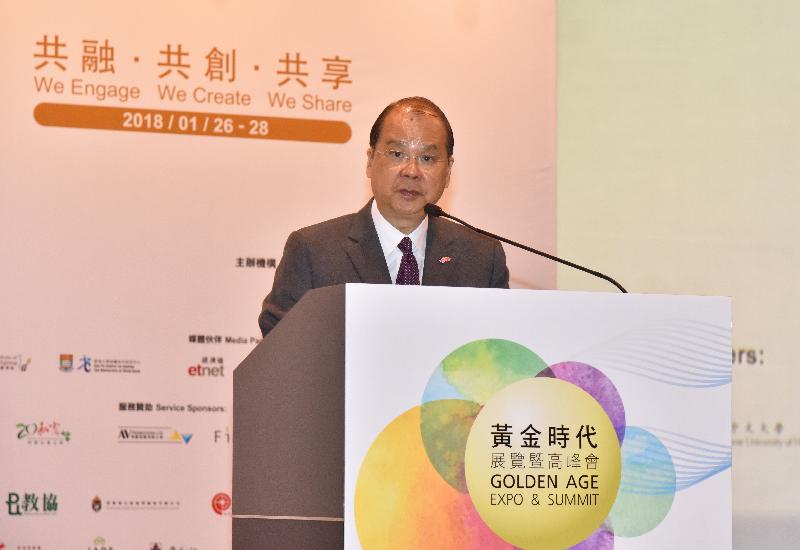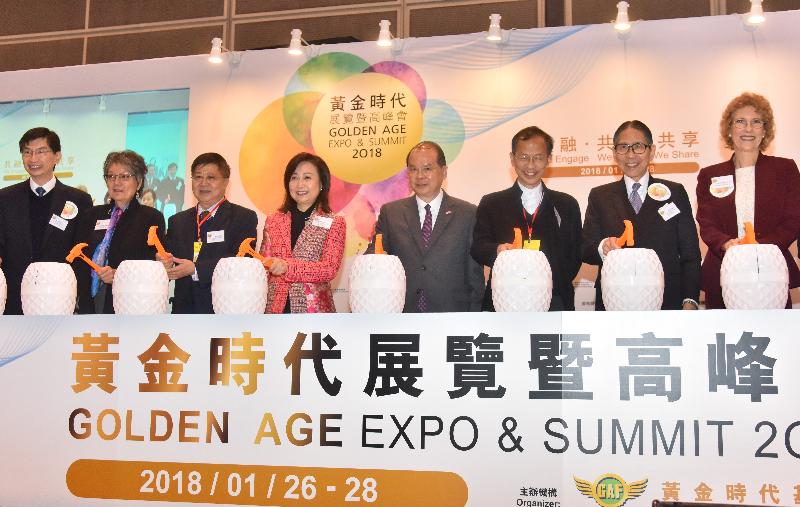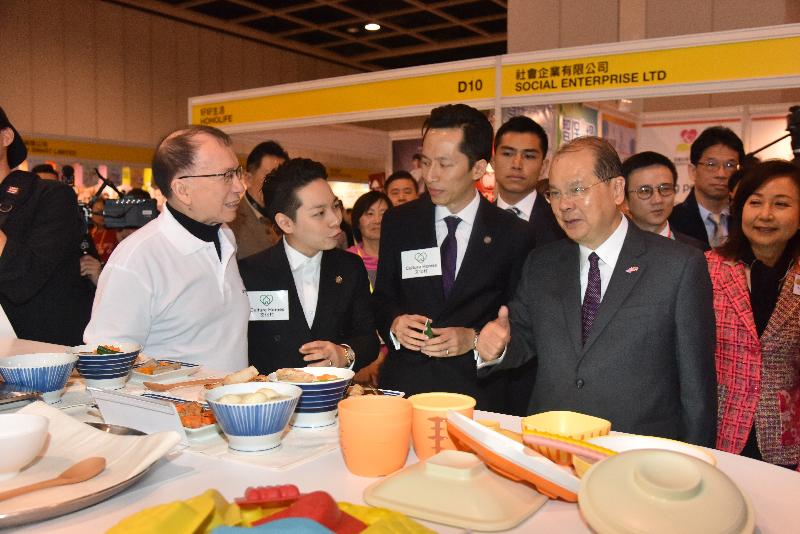Speech by CS at Golden Age Expo and Summit 2018 opening ceremony (English only) (with photos/video)
******************************************************************************************
Rebecca (Founder and Chair of the Golden Age Foundation, Ms Rebecca Yung), distinguished guests, ladies and gentlemen,
Good morning. It is my honour to join you all at this opening ceremony to celebrate Hong Kong's third edition of Golden Age Expo and Summit. First of all, I would like to express my heartfelt gratitude to the Golden Age Foundation for staging this very important event. To all speakers and delegates from the Mainland and overseas, let me extend a very warm welcome to this vibrant city.
I have always been a great fan of this congregation for golden ideas. I officiated at its inaugural opening two years ago. Last year, I contributed a pre-recorded video message as I was not able to join in person. This year, I return in a new official capacity and I assure you that my support for the Golden Age Expo and Summit and the well-being of elderly has not changed.
I am particularly delighted to note that this year's Expo and Summit has been extended to three days and attracted over 70 prominent speakers from 10 countries to talk about various subjects of smart ageing. There are altogether 100 exhibition booths alongside experimental areas and performances by retirees to demonstrate to over 20 000 visitors from Hong Kong, the Mainland and overseas the prosperous retirement life of our golden agers and the fast growing "silver hair market".
Like many places around the globe, Hong Kong is facing a rapidly ageing population. Today one in 6.5 people in Hong Kong is aged 65 or above. In 20 years, it will be about one in three, and among them the group of "old-olds" or elderly people aged 85 or above, will be more than double from the current 173 000 to around 378 000. It is also expected that three out of five people turning 65 today will live to 85 or beyond and two of them to at least 90. Many Hong Kong people will therefore enjoy a retirement span as long as two or three decades.
The Hong Kong Special Administrative Region Government attaches great importance to the well-being of our elderly population. At present, a significant 20 per cent of the Government's recurrent expenditure goes to health services and welfare support for our elderly population. While the demographic shift can be challenging to our healthcare and welfare systems, we see opportunities for exploring innovative policy solutions to keep public services up to date with changing needs and ensure more effective use of limited resources.
The Government is committed to promoting active ageing to unleash and harness the potential of our senior citizens. It is also our policy to accord priority to the provision of home care and community care, supplemented by residential care. We are allocating more resources to enhance community and home care services, with the long-term goal of achieving zero waiting time for service users. This will enable the elderly, especially those in need of extra care, to relax and enjoy life in a familiar environment. For example, to support ageing in place for elderly persons with moderate or severe impairment, we have launched the Pilot Scheme on Community Care Service Voucher for the Elderly. The scheme is now in its second phase and we keep on increasing the service quota as far as possible. The number of vouchers has been increased by 2 000 since last August, and will be further raised to 6 000 in 2018-19.
There are also other new initiatives to cater for different needs. The Pilot Scheme on Home Care and Support for Elderly Persons with Mild Impairment, launched last December, is primarily designed for low-income elderly persons with mild impairment. The Pilot Scheme on Support for Elderly Persons Discharged from Public Hospitals After Treatment, which is expected to be launched next month, will formulate discharge support plans and arrange transitional residential and community care and support services for elderly patients.
Support is also provided for elderly people living in private institutions. A new four-year pilot scheme will be launched in the fourth quarter of this year to assign district-based professional teams comprising social workers, physiotherapists and occupational therapists to provide outreach services for, among others, private residential care homes to support the elderly residents' social and rehabilitation needs. Visiting medical practitioner services will also be provided to take proactive measures against seasonal influenza and other episodic illnesses, so as to improve the general health of the elderly residents and reduce their reliance on the public healthcare system. In addition, we will include more recognised service providers in the Pilot Scheme on Residential Care Service Voucher for the Elderly to follow through the principle of "money-following-the-user" and enhance the service quality of private elderly homes. We believe that these measures can strengthen the complementary roles of public and private organisations in the provision of elderly care.
To keep improving services and facilities of the public healthcare system, we will deploy ample resources and enhance the supporting infrastructure. We will introduce a new arrangement by undertaking to increase the recurrent funding for the Hospital Authority progressively on a triennium basis, having regard to population growth rates and demographic changes. This will enable Hospital Authority to address the staffing issue and service demands arising from a growing and ageing population in a more effective and sustained manner.
On supporting infrastructure, the Government and the Hospital Authority will press ahead with the delivery of the 10-year Public Hospital Development Plan, for which $200 billion has been earmarked, and kick-start the next round of public hospital development planning in the coming five years.
On healthcare manpower, over 2 000 medical graduates will register as medical practitioners in the next five years. The Hospital Authority will employ all qualified local medical graduates and provide them with relevant specialist training. It will also proactively recruit qualified non-locally trained doctors through limited registration to provide clinical services in the public healthcare system.
In parallel, the Hospital Authority will set up more nurse clinics and seek to achieve better results by deploying multi-disciplinary teams. It will also increase the number of pharmacists to strengthen its clinical pharmacy service, including considering ways for better resource deployment to improve pharmacy services for elderly persons living in elderly homes.
To enhance community health through cross-sector and multi-disciplinary collaboration, we will regularise the Dementia Community Support Scheme and extend it to all 41 district elderly community centres so that appropriate support services can be provided for elderly people with mild or moderate dementia and their carers through a medical-social collaboration model.
Smart ageing in a smart city will of course involve technology. Innovation and technology is not a single industry, but a new model of development. The development of innovation and technology can lead to new industries and create wealth, thereby improving the daily lives of our people including our elderly. Many innovative technologies such as electronic wheelchairs, medical image scanning systems and medical equipment for stroke rehabilitation developed by local manufacturers have already come on stream.
In this regard, we have launched the $500 million Innovation and Technology Fund for Better Living to support projects that make people's daily living more convenient, comfortable and safer, or address the needs of specific community groups through the innovative applications of technology. Elderly is of course one of the beneficiary groups.
We also encourage universities and research institutes to translate outstanding local research and development achievements into products and services, including application of technology and innovation in elderly care. To this end, we have introduced the Public Sector Trial Scheme to conduct trials in the public sector to facilitate and promote the realisation and commercialisation of research and development results including those related to gerontechnology.
To proactively promote gerontechnology for improving the quality of life of elderly persons and reduce the burden and pressure on carers and care staff, the Government has earmarked $1 billion for setting up a fund to subsidise elderly service units to trial use and procure or rent technology products. The initiative will also cover rehabilitation service units. As technology progresses, the ways in which we can help elderly persons live independent and satisfying lives will only continue to grow.
While the Government has spared no effort in promoting a smart and caring ageing community in Hong Kong, we need the support of the entire community, the business sector and the academia altogether to achieve the mission. I therefore must extend my warmest appreciation again to the Golden Age Foundation. Thank you once again for organising this visionary event for our golden agers.
On this note, I wish the Golden Age Expo and Summit 2018 another great success, all participants a most stimulating and fruitful experience, and our guests from the Mainland and overseas a pleasant stay in Hong Kong. Thank you.
Ends/Friday, January 26, 2018
Issued at HKT 12:21
Issued at HKT 12:21
NNNN





